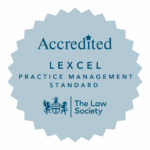What is Testamentary Capacity?
For a Will to be valid, the person making the Will (‘the Testator’) needs to have the necessary capacity to make a Will. This requirement by law is for all Testators who wish to make a Will.
The test for capacity requires the Testator to:
- Understand the nature of making a Will and its effects
- Understand the extent of the property of which he/she is disposing
- Be able to comprehend and appreciate the claims to which they ought to give effect
- Have no disorder of the mind that perverts his / her sense of right or prevents the exercise of his / her natural faculties in disposing of his property by Will
The Testator is required to have a certain level of understanding that they are making a Will and appreciate the implications of this. The level of understanding depends on the complexity of the Will itself, the Testator’s assets and any potential claims on the Testator’s estate.
What does ‘lack of Testamentary Capacity’ mean?
More than half of the UK adult population have not made a Will. Amongst these are individuals who no longer have testamentary capacity as a result of developing a medical condition such as Alzheimer’s or dementia, or they may have been involved in an accident that affects their brain function.
Although an individual may lack testamentary capacity, it does not necessarily mean that they are unable to make a Will, with their estate being subject to the rules of intestacy. An application may be made to the Court of Protection for permission to make a Will on behalf of the person who has lost capacity. This is called a Statutory Will.
A Statutory Will may be appropriate for individuals who lack testamentary capacity in the following circumstances:
- A vulnerable person who has not made a Will before
- The estate has reduced or increased in value (for example as a result of compensation awarded following an accident)
- For tax planning purposes
- A beneficiary under their existing Will has already received substantial gifts during their lifetime or the beneficiary has passed away
A Statutory Will is most appropriate and likely to be approved by the Court of Protection in circumstances where a vulnerable person lacks capacity and has not made a Will before or if their circumstances (whether financial or otherwise) have changed significantly.
Steps taken by Practitioners when testamentary capacity is in doubt
When assessing whether a client passes the test for testamentary capacity, the solicitor obtaining instructions will keep a record of the Client’s wishes in their Will and responses to questions put forward by the solicitor. The solicitor will note whether the Client has understood the nature of their Will, retained information about the way his / her assets are being disposed of under their Will, weighed up the information to help make such decisions and able to communicate those decisions clearly.
It may be that a solicitor deems it appropriate to obtain a medical opinion confirming testamentary capacity, such as from the Client’s GP. A medical practitioner may witness the Testator’s signing their Will if deemed necessary. If either of these are not possible, then the solicitor must explain to the Client the increased risk of the Will potentially being successfully challenged due to the lack of medical evidence of testamentary capacity. The solicitor should keep contemporaneous records of the advice given to the Client’s decision.
If you are concerned about capacity issues or need advice on making a Will for yourself or a loved one, our personal injury claims solicitors at Hatch Brenner have extensive experience in working alongside clients and their families where cognitive impairment or brain injury is a factor. We can assist with applications to the Court of Protection for Statutory Wills, as well as support with broader legal matters relating to loss of capacity.
Making a Will
If you would like to make a Will, contact Bengi Karakus in the Private Client Team at Hatch Brenner Solicitors who would be happy to help, call 01603 214 .





